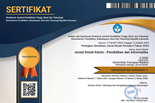Aplikasi Media Pembelajaran Ubiquitous Learning Of Angle Dengan Penerapan Pendekatan Otentik
Abstract
Covid-19 has given a new personality to education in Indonesia. The use of technology which used to be very limited, but now become an important requirement in the teaching and learning process. The learning process that used to only use blackboards or teaching aids has many limitations and can be completed by utilizing technology with media according to the subject area. Therefore, this research develops a learning media with the name "Ubiquitous Learning of Angle" which we hereinafter refer to as ULA. ULA is expected to be used by Education and Students in the teaching and learning process, especially in corner material. In developing this ULA learning media, the researcher applied the authentic approach in its application. The research methodology used in developing this application is the waterfall methodology which has 5 development processes. In the development of ULA, the hardware used was laptops and smartphones and the software used included CorelDraw, Unity3D, xampp, and Visual Studio. The outputs of this research are ULA (Ubiquitous Learning of Angle) learning media applications for students and ULA Monitoring to monitor students' learning progress.
Keywords
Full Text:
PDFReferences
Hwang, WY., Nurtantyana, R., Putra, M.T.M. (2021). Facilitating 3D Geometry Learning with Augmented Reality in Authentic Contexts. In: Huang, YM., Lai, CF., Rocha, T. (eds) Innovative Technologies and Learning. ICITL 2021. Lecture Notes in Computer Science(), vol 13117. Springer, Cham. https://doi.org/10.1007/978-3-030-91540-7_8
L. Sun, L. Hu, W. Yang, D. Zhou, and X. Wang, “STEM learning attitude predicts computational thinking skills among primary school students,” J. Comput. Assist. Learn., vol. 37, no. 2, pp. 346–358, Apr. 2021, doi: https://doi.org/10.1111/jcal.12493.10.1080/14703297.2017.1417147
M T M Putra and R Wardani 2021 J. Phys.: Conf. Ser. 1737 012034.
M. M. Lombardi and D. G. Oblinger, “Authentic Learning for the 21st Century : An Overview,” no. January 2007, 2014.
N. Koh and H. K. Low, “Learning Mathematical Concepts through Authentic Learning.,” Math. Educ. Res. Gr. Australas., 2010.
Wardani, R., W.Y. Hwang, M. Zakaria, Priyanto, M.I. Lutfi, I. N. Rochmah, A. F. Rahman, & M. T. M. Putra. 2021. An Authentic Learning Approach to Assist the Computational Thinking in Mathematics Learning for Elementary School. ELINVO (Electronics, Informatics, and Vocational Education), vol. 6, no. 2, pp. 139 – 148, doi: https://doi.org/10.21831/elinvo.v6i1.47251.
Yudha, R.P. (2019). Pengembangan Instrumen Asesmen Otentik Tes Keterampilan Berpikir Kritis pada Pembelajaran Matematika. Mathline: Jurnal Matematika dan Pendidikan Matematika, Vol.4, No.1, 9-20
DOI: https://doi.org/10.21107/edutic.v10i1.20475
Refbacks
- There are currently no refbacks.
Copyright (c) 2024 Muhammad Trio Maulana Putra

This work is licensed under a Creative Commons Attribution 4.0 International License.
Indexed by:
 J. Ilm. Edutic is licensed under a Creative Commons Attribution 4.0 International License.
J. Ilm. Edutic is licensed under a Creative Commons Attribution 4.0 International License.















